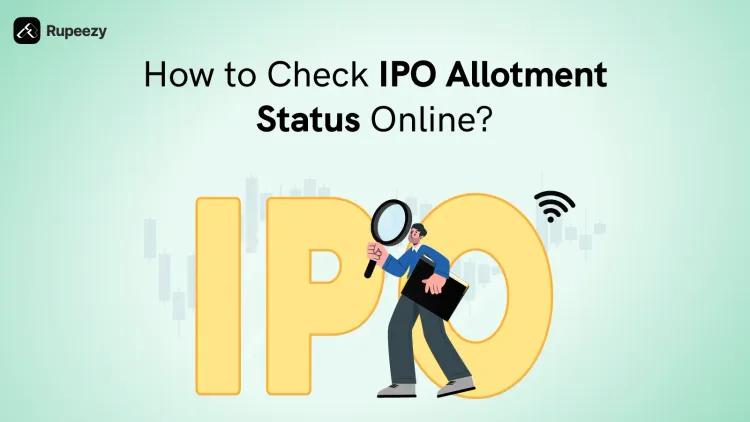How to Get IPO Allotment Easily – Tips and Tricks


00:00 / 00:00
In the last few years, India has seen a tremendous craze for IPOs. The IPOs like Nykaa, Zomato, and IRCTC were readily accepted by the people, and these IPOs were so oversubscribed that shares were not allotted to lakhs of investors. In such a situation, the question arises, "How to get IPO allotment?"
In this blog, we will tell you how IPO allotment works, the reasons why you do not get an IPO, and tricks to get IPO allotment. So let’s get started!
What is IPO allotment?
An Initial Public Offering is the process by which a company sells its shares to the public for the first time.
When you apply for an IPO, it means that you want to buy some shares of that company. But it is not necessary that everyone get shares; this is where the concept of IPO allotment comes in.
When many people apply for an IPO, it gets oversubscribed, then it is not possible to give shares to everyone. In such a situation, the registrar of companies (such as Link Intime or KFinTech) decides through an automated lottery system who will get allotment and who will not. This process is called the basis of allotment.
IPO allotment is divided into different investor categories:
Retail Investors (investments up to Rs. 2 lakh)
HNI (High Net Worth Individuals) – above Rs. 2 lakh
QIB (Qualified Institutional Buyers)—such as mutual funds or insurance companies
Apart from this, the allotment process in SME IPOs is slightly different and relatively easier due to lower competition. If you want to increase your chances of IPO allotment, investing in the SME segment can be a good option. However, always apply only after proper analysis and a clear understanding of the company.
10 Tips and Tricks to Get IPO Allotment
With the boom in upcoming IPOs, oversubscription has become common. Follow this proven trick to get IPO allotment easily and stay ahead of the crowd:
1) Use Demat Accounts of Family Members:
As per IPO rules, only one application is valid from one PAN number. But if other people in your family have Demat accounts (like parents, wife, siblings), then you can apply in their name as well. This increases the chances of allotment manifold.
2) Stick to Minimum Lot Size:
As per SEBI rules, when an IPO is oversubscribed, an attempt is made to give one lot each to all retail investors first. In such a situation, applying for more lots does not help. Therefore, it is better that you apply for only one lot - this also reduces the risk of rejection.
3) Avoid Oversubscribed IPOs:
If an IPO gets 50–100 times subscription on the first day, then the chances for retail investors are very low. In such a situation, it is better to skip such IPOs or focus on SME IPOs where there is less competition.
4) Use Bank-Based Apps for UPI:
Some third-party apps like GPay or PhonePe may have errors in the IPO mandate. So, use BHIM or the bank's official UPI app; these are more secure and reliable.
5) Approve UPI Mandate Instantly:
Often, investors approve the UPI mandate late after it arrives, due to which the application gets rejected. As soon as you receive the request on UPI, approve it immediately so that your entry is validated on time.
6) Avoid HNI Bids with Small Amounts
The competition in the HNI category is very high, and allotment is done on a pro-rata basis. If you do not have a large amount, stay away from this category and apply in retail only.
7) Check KYC and Active Status of Demat Account :
Before applying, ensure that your Demat account is fully KYC compliant and active. Applications made from accounts with inactive or incomplete KYC may be rejected.
8) Use ASBA (Apply through Net Banking):
ASBA (Application Supported by Blocked Amount) is a secure method where your amount is only blocked and automatically released if you do not get an allotment. Applications made through Net Banking are more reliable and have fewer failures.
9) Apply Mid-Window, Not Last Minute:
The last day of the IPO may have technical issues or server load. So don’t rush on the first day or take risks on the last day – the best time to apply is after noon on the first or second day.
10) Target SME IPOs for Better Chances:
If you really want to get an IPO allotment, focus on SME IPOs. These have less number of investors, and hence chances of getting an allotment are higher especially for new investors.
By adopting these smart strategies, you can greatly increase your chances of getting a successful allotment in an IPO. Luck does play a role in IPOs, but with the right preparation, your turn can definitely come.
Factors That Influence IPO Allotment
When you apply for an IPO, it is not necessary that you get shares. IPO allotment is completely based on a fixed process, and there are some important things in it that can increase or decrease your chances of allotment. Let's know the main factors that affect IPO allotment:
1) Your Investor Category:
There are three main categories in IPO:
Retail Investor: Those who invest up to Rs. 2 lakh
HNI (High Networth Individual): Above Rs. 2 lakh
QIB (Qualified Institutional Buyer): Like mutual funds, insurance companies
A fixed percentage is reserved for each category. There is a lot of competition in the retail category, so the lottery system works.
2) Level of Oversubscription:
If an IPO is oversubscribed (eg, 100 times), then your chances of allotment are very low. There is a higher chance of getting an IPO in a less oversubscribed IPO.
3) How Many Lots Did You Apply For
In the retail category, an investor gets only one lot, whether he has applied for 1 lot or 10. Therefore, there is no benefit in applying for more lots.
4) Demat Account Status :
If your Demat account KYC is not complete or it is inactive, then you will not be allotted an IPO. Keep the account updated and active before applying.
5) Time to Apply for IPO:
Many people believe that applying on the first day will get shares, but this is not true. As long as you approve the UPI mandate on time, your entry is considered valid, whether you apply on the first day or the last day.
6) UPI Mandate Approval:
Many investors do not approve the UPI mandate on time, which leads to their application getting rejected. So as soon as the UPI link arrives, approve it immediately.
7) Your broking platform:
Some broking platforms like Rupeezy, Groww, Upstox, etc., offer a fast and easy interface. But sometimes bank-linked ASBA portals prove to be more reliable. The performance of the platform can also play a role in the success of your application.
By keeping all these things in mind, you can increase your chances of IPO allotment to a great extent.
How to Check IPO Allotment Status?
After applying for an IPO, the biggest curiosity is whether the shares have been allotted or not. You can check this status very easily by following the methods given below:
Check from the registrar’s website
Visit their official website.
Click on the “IPO Allotment Status” section.
Enter your PAN number/Application number/DP ID.
Fill in the CAPTCHA and click on ‘Submit’.
You will see the allotment status immediately on the screen.
Check from the BSE/NSE website
Visit the BSE India website.
Select Equity and choose the name of the IPO you applied for.
Enter your PAN number.
Fill in the CAPTCHA and click on the Search button.
The allotment status will be displayed immediately.
Check allotment status through your Demat account
Investors can also check IPO allotment status through their Demat account. If you have been allotted shares, they will be visible in your Demat account on the day of listing.
Shares are credited to your account by the evening of the day before the PO listing or by the morning of the listing day. If allotment is not done, your money is automatically refunded within a few days
Which Broker is Best for IPO Allotment?
Choosing the right broker is very important when applying for an IPO as it not only makes the application process easier but can also improve the chances of getting allotment.
Today, discount brokers like Rupeezy are quite popular among investors. The interface of these platforms is user-friendly, and you can easily apply for IPO through UPI, that too in just a few clicks.
Rupeezy, a registered stockbroker, gives you a quick, easy, and convenient way to apply for IPOs. On Rupeezy, you can apply for any mainline or SME IPO in just a few steps via UPI, hassle-free.
How to Calculate IPO Allotment Probability?
Allotment in IPO is completely based on the lottery system, especially for retail investors. But you can definitely get an idea of your chances of getting allotted.
For this, you have to look at two things:
How many people have applied in the retail category (Total Applications)
How many lots are available (Total Lots)
Suppose 10 lakh people have applied in an IPO, and only 1 lakh lots are available, then your chance of getting allotment will be approximately 1 in 10, i.e., 10%.
We will get this data in the Subscription Status section on the NSE or BSE website after the IPO closes.
If retail oversubscription is very high, then there is no benefit in applying for more than one lot, because the lottery is for only one lot per PAN.
Conclusion
IPO allotment is completely based on the lottery system, but by following some right practices and precautions, you can increase your chances of getting an allotment. Such as applying on time, keeping UPI activated beforehand, and applying once with the same PAN, these small things make a lot of difference. If you also look at SME IPOs, the chances of getting an allotment are slightly higher as they have a smaller retail crowd.
Applying for an IPO is very easy on a trusted and professional stock broking platform like Rupeezy. Our user-friendly interface, fast processing, and easy guidance for investors make it an excellent choice for both new and experienced investors.
FAQs
1. How can you get an IPO easily in India?
To get an IPO easily in India, apply on time, apply only once with one PAN, and have UPI linked beforehand. Also apply in SME IPOs where there is less crowd.
2. What are the chances of getting IPO allotment in a popular issue?
If an IPO gets a lot of subscriptions, then the chances of allotment decrease. In such a situation, only about 1 in 10 people get shares through the lottery
3. Can I apply from two accounts with the same PAN?
No, you cannot apply twice with the same PAN number. If you do, your application may be rejected. Every investor should apply only once.
4. Is UPI mandatory for IPO applications?
Yes, UPI is required for retail investors during online IPO application. It is a fast, secure, and easy payment option that is approved by SEBI.
5. How to check IPO allotment status online?
You can check IPO allotment status from the NSE, BSE website, or from the website of the registrar ,Just enter your PAN or application number.
The content on this blog is for educational purposes only and should not be considered investment advice. While we strive for accuracy, some information may contain errors or delays in updates.
Mentions of stocks or investment products are solely for informational purposes and do not constitute recommendations. Investors should conduct their own research before making any decisions.
Investing in financial markets are subject to market risks, and past performance does not guarantee future results. It is advisable to consult a qualified financial professional, review official documents, and verify information independently before making investment decisions.

All Category







